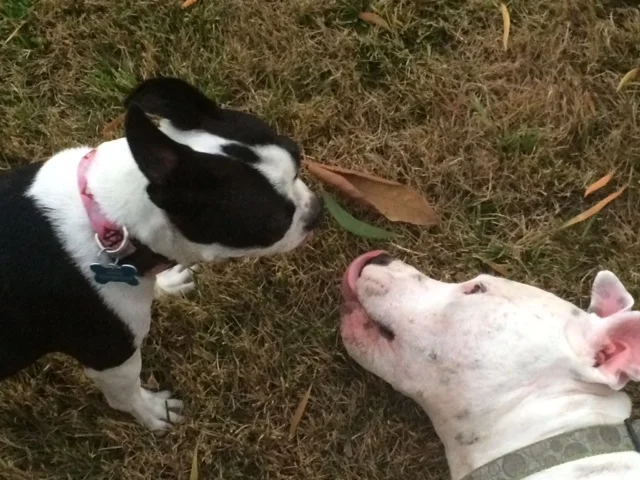Say the phrase “K9 Unit” and certain breeds of dog spring to mind. German Shepherds, Belgian Malinois and Labrador retrievers generally fill the ranks of law enforcement because of their trainability and drive to work.
Brian Croft, who heads Universal K9 in San Antonio, believes that these qualities are not lost on Pit Bulls. So much so that he takes in Pits that have either been abandoned or passed-over at shelters and trains them to sniff out drugs, detect bombs and track people. Through his work, Croft sees the opportunity not only to help this misunderstood breed find a purpose, but to help rehabilitate its image.
“They’ve got this breed all wrong,” Croft told CBS News this Morning. “This dog is the exact opposite of what it’s painted to be.”
Funded by The Animal Farm Foundation, an animal welfare group, Universal K9 has graduated more than 30 Pits to police and sheriff’s departments across the country to help protect and serve their adopted communities.
“We’re saving a life - which is a dog - and we’re saving that life to save many lives,” Croft said.
Rescue Legacy applauds the individual and collaborative efforts of animal groups, trainers and law enforcement toward rehabilitating the devastated image of the Pit Bull breed and finding a noble purpose for this hearty and energetic animal companion.
At the same time, the perception of a Pit Bull’s function should not be limited to protectors of life, limb and land. By doing so, we risk perpetuating the notion that Pits serve only as a menacing force - even if it is a force for good.
True, a Pit Bull packs a wad of power in a stout frame housing the most loyal of hearts. Through the years, dastardly specimens of the male gender calling themselves “men” have co-opted that power and loyalty for status and sport. Wanting nothing more than to please their “masters,” the behavior of some Pit Bulls morphed into the stereotype we’ve come to fear and loathe. Thanks to malicious owners, Pit Bulls are banned in dozens of U.S. cities.
Sadly, few people understand or allow themselves to experience the flip side of a Pit’s loyalty: an insatiable desire to please and an unbending and lavish affection toward family and anyone that comes to be known as a friend.
I have nearly been licked to death by the half-dozen Pits I’ve come to know well through deep human friendships or via play dates with our Boston terrier, Lilly. Each Pit that has played with our girl seems to have had an innate appreciation of the size and strength differential and has modulated his or her play style and energy accordingly. I learned from my ancient days of intramural sports that many humans do not possess this skill.
Pit Bull advocacy groups nationwide are hard at work to flesh out the many and wondrous dimensions of the Pit Bull in the minds of dubious pet lovers and the public at large. Part of that education lies in an understanding of media bias and a survey of history; it was not too long ago that German Shepherds - once over-bred and under-loved - wore the crown of “most vicious dog breed.”
It’s been said that every dog needs a purpose, as do we. It is also essential to remember that a purpose is not one-dimensional. Far beyond the potential to sniff out contraband and corral criminals, a Pit, just like the Shep and Lab, is just plain good company.

